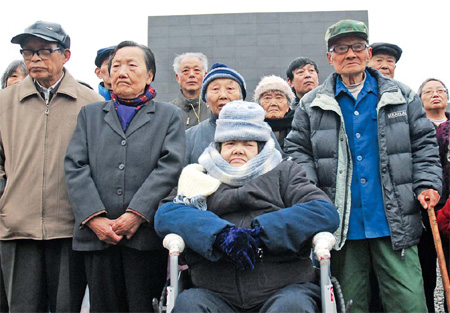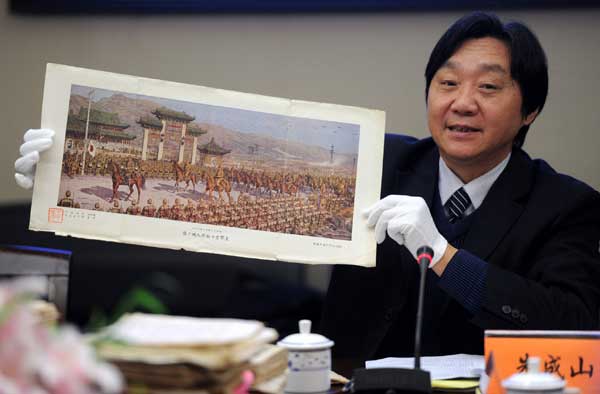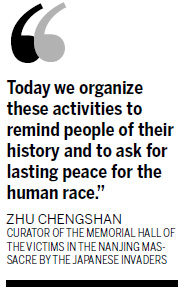Photos
Nanjing remembers poignant history
Updated: 2010-12-14 08:03
By Wang Jingqiong and Song Wenwei (China Daily)
 |
|
Nanjing scars still raw Ha Menghe (in wheelchair) and other survivors of the Nanjing Massacre attend a memorial ceremony on Monday in the capital city of Jiangsu province to mark the 73rd anniversary of the tragedy. More than 300,000 Chinese people were killed by the Japanese invaders in December 1937, during a six-week-long orgy of killing, burning, looting and raping. [Photo by Han Hua / for China Daily] >>More Photos |
NANJING - In cold rain under a dark sky, an aerial defense alarm sounded to commemorate the 300,000 Chinese civilians and prisoners of war killed in the Nanjing Massacre in 1937.
More than 5,000 people gathered in tribute on Monday morning on the square outside the Memorial Hall of the Victims in the Nanjing Massacre by the Japanese Invaders in Nanjing, capital of East China's Jiangsu province.
| ||||
"Today we organize these activities to remind people of their history and to ask for lasting peace for the human race," said Zhu Chengshan, curator of the memorial hall.
Participants in the ceremony included 15 monks from six Buddhist temples in Japan, along with more than 50 monks and Buddhist followers from China. The monks chanted scriptures of mourning and prayed for peace.
Aori Take Shuna, abbot of Japan's Reiunti Temple, read a poem he wrote in honor of the dead and prayed for long-term friendship between the people of China and Japan.
Yamauchi Sayoko, a representative of a sect of Japanese Buddhism, spoke at the assembly, saying that the Japanese who invaded and occupied China in the 1930s and 1940s were deeply regretful for the victims of the war and sincerely hope such a tragedy will never be repeated.
 |
|
Zhu Chengshan, curator of the Memorial Hall of the Victims in the Nanjing Massacre by the Japanese Invaders in Nanjing, on Monday displays a painting featuring the Japanese army entering the city - then the capital of China - in December 1937. The memorial hall recently received 17 war relics donated by a Japanese man surnamed Ohigashi. [Photo/Xinhua] |
Thirty survivors of the massacre and relatives of some of the victims were also in attendance.
She Ziqing, a 78-year-old survivor, said: "Each year on the anniversary, I especially miss my family, who were cruelly murdered by the Japanese invaders. I hope all massacre victims can rest in peace."
Zhang Chenguang, a third-year student from Jiangdongmen Primary School, attended a candle lighting ceremony held on Sunday night in memory of the massacre victims.
"I learned more about the history of our city, and the cruel history makes me treasure the life we're living today even more," he said.
On Sunday, construction began to extend the "wailing wall" outside the memorial hall, where the names of the victims have been engraved.
When the wall was built in 1995, the names of 3,000 victims were inscribed on it. The list was expanded to more than 8,600 names for the 70th anniversary of the massacre in 2007.
Once the extension is completed, another 1,665 will be added to the list, which will soon include a total of 10,324 victims.
Zhu said collecting the names of the victims is an important part of research into the massacre, though with the passing years it has become increasingly difficult to find witnesses and documents to corroborate events.
He said the current list was compiled following careful investigation and the oral accounts of massacre survivors and those of victims' families.
Japanese troops occupied Nanjing, which was then the capital of China, on Dec 13, 1937, and launched a six-week massacre. Chinese records show more than 300,000 people - disarmed soldiers and civilians - were killed.
To commemorate the dead and express hope for continued peace, Nanjing began the practice of sounding sirens on the anniversary of the occupation in 1997 and in 2002 made Dec 13 International Peace Day for Nanjing.
Liu Jieping, a resident of Nanjing, said although the Japanese aggressors did terrible things to the city in 1937, these days the people of Nanjing do not hate the Japanese.
Xinhua contributed to this story.
E-paper

Ear We Go
China and the world set to embrace the merciful, peaceful year of rabbit
Preview of the coming issue
Carrefour finds the going tough in China
Maid to Order
Specials

Mysteries written in blood
Historical records and Caucasian features of locals suggest link with Roman Empire.

Winning Charm
Coastal Yantai banks on little things that matter to grow

New rules to hit property market
The State Council launched a new round of measures to rein in property prices.


